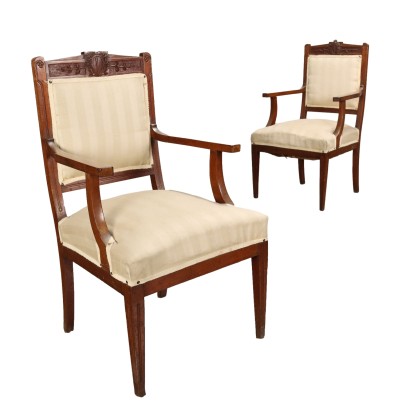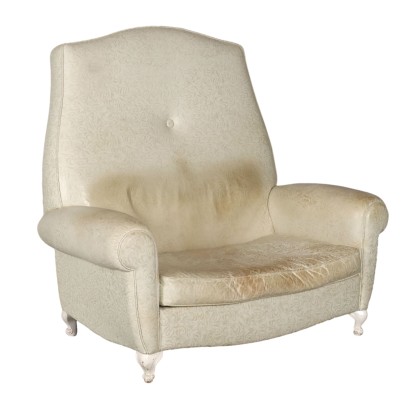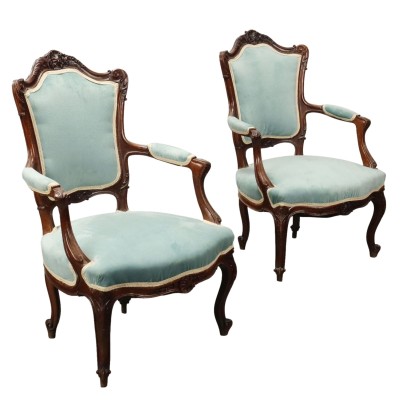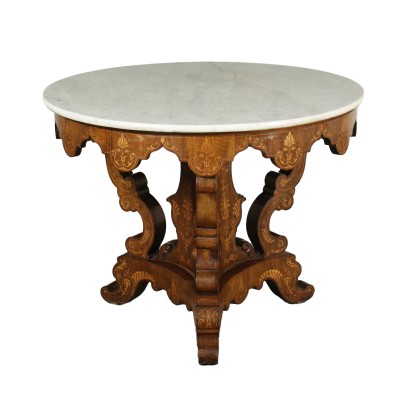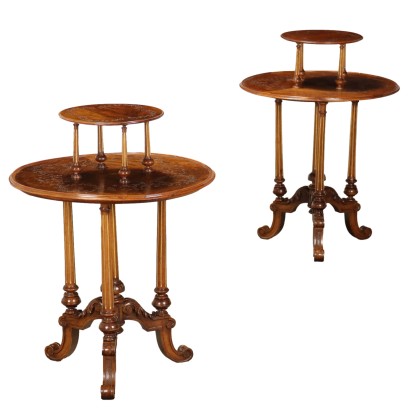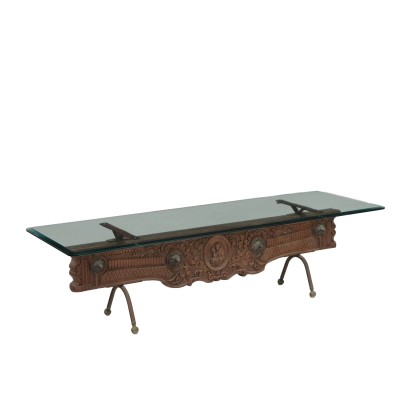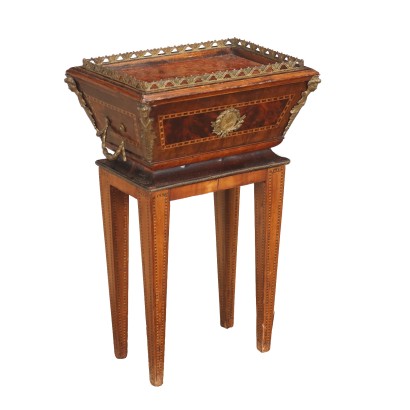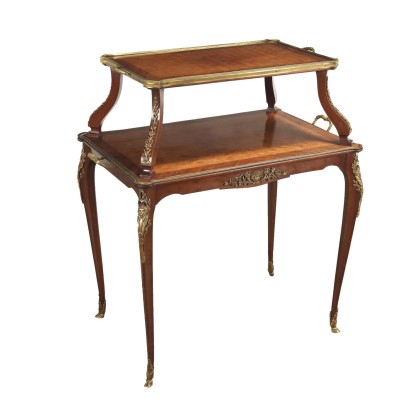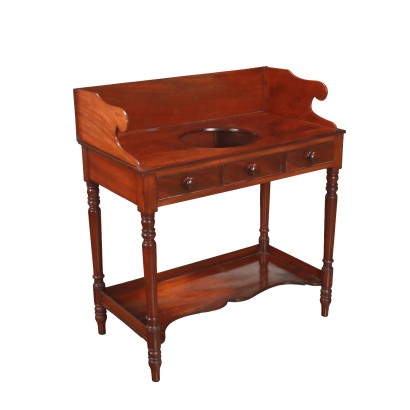Pair of Armchairs Art Nouveau Mahogany Italy XIX-XX Century - Italy Late XIX-Early XX Century
Features
Italy Late XIX-Early XX Century
Style: Art Nouveau (1890-1920)
Age: 19th Century / 1801 - 1900 , 20th Century / 1901 - 2000
Origin: Italy
Main essence: Mahogany
Material: Padded , Carved Wood
Description
Pair of Art Nouveau mahogany armchairs, Italy, late 19th - early 20th century. Carved wood with phytomorphic and foliaceous motifs, with a floral wreath placed in the center of the top part; truncated pyramid legs with breadsticks. Upholstered backrest and seat.
Product Condition:
Product which due to age and wear requires restoration and re-polishing. We try to present the real state of the furniture as fully as possible with photos. If some details are not clear from the photos, what is reported in the description will prevail.
Dimensions (cm):
Height: 96
Width: 54
Depth: 58
Seat height: 47
Additional Information
Style: Art Nouveau (1890-1920)
Historical stylistic period formed from the end of the 19th century (c. 1890) after the Umbertino style and continued until the First World War.The current was characterized by the floral influence and the soft and curved lines, a typical example are the "whiplashes".
The first signs of this new era came from architects such as Hector Guimard (1867-1942) who built numerous buildings and hotels, but also from people such as Arthur Mackmurdo furniture designer and Arthur Liberty late 19th century London industrial and merchant who began to produce upholstery fabrics with floral motifs with soft and sinuous shapes.
The 1900 Paris Universal Exposition was an important point for the development and affirmation of Liberty in the following decade.
Liberty was called in different ways according to the nation, universally known as Art-Nouveau and it is thought that Arthur Liberty derives the name given in Italy to this beautiful stylistic current.
The name Art-Nouveau, on the other hand, is thought to derive from a shop located in Paris called Maison de l'Art Nouveau which began to show off furniture items with a new and innovative design in its windows.
With the end of the First World War, the naturalistic period of Liberty ended and the Art-Decò style emerged with more rigid and geometric lines.
Find out more about the Liberty style with our insights:
Art Nouveau: birth and development of a style
Milan Liberty between flowers and colors
The Liberty of Carlo Zen
Decorative forms and elegance in a Liberty lounge
FineArt: Eoloe Cupido, Liberty sculpture by Luca Madrassi
FineArt: Nymph and Faun, Art Nouveau sculpture by Giuseppe Siccardi
Age:
19th Century / 1801 - 1900
19th Century / 1801 - 190020th Century / 1901 - 2000
20th Century / 1901 - 2000Main essence: Mahogany
It is one of the most precious and sought-after woods in cabinet making. It was discovered in Central America around 1600 and began to be imported to England in the 1700s. Much appreciated for its hardness and indestructibility, it became widespread following the blocking of walnut exports from France in 1720 and the consequent elimination of English import duties on mahogany from the colonies in America and India. The most valuable version comes from Cuba, but it became very expensive. At the end of the 18th century it began to be used also in France in Louis XVI, Directory and Empire furniture, its diffusion declined starting from when Napoleon, in 1810, forbade its import. It was generally used in the manufacture of elegant furniture, due to its characteristics and beautiful grain.Material:
Padded
Carved Wood
Other customers have searched:
Poltrona, seggiolone, trono, poltrona antica, poltrona da ufficio, bergère ..
Dai un'occhiata anche ai nostri approfondimenti sul blog e alle presentazioni di FineArt:
Leggi di più
La poltrona Bergère: trasformazioni di un intramontabile classico
Dici relax e pensi poltrona
Breve storia della sedia, dall'Antico Egitto alla produzione in serie
Seggiolone, Roma XVII secolo
E dai un'occhiata anche alle poltrone tra gli arredi di design
Poltrone Delfino, Erberto Carboni per Arflex
Poltrona 'Fiorenza', Franco Albini per Arflex
Poltrona Regent, Marco Zanuso per Arflex
Poltrone Delfino, Erberto Carboni per Arflex
Poltrona '806' Carlo De Carli per Cassina
Sull'antiquariato in generale dai un'occhiata anche a:
Classic Monday: da un pezzo dei nostri magazzini alla storia dell'antiquariato
L'antiquariato dalla A alla Z: il Dizionario dell'Antiquariato
Il dizionario dell'antiquariato - Lastronatura
Il dizionario dell'antiquariato - Mascherone
Il dizionario dell'antiquariato - Natura morta
Il dizionario dell'antiquariato - Opificio
Il dizionario dell'antiquariato - Pastiglia
Il dizionario dell'antiquariato - Savonarola
Il dizionario dell'antiquariato - Rosone
Leggi di più
La poltrona Bergère: trasformazioni di un intramontabile classicoDici relax e pensi poltrona
Breve storia della sedia, dall'Antico Egitto alla produzione in serie
Seggiolone, Roma XVII secolo
E dai un'occhiata anche alle poltrone tra gli arredi di design
Poltrone Delfino, Erberto Carboni per Arflex
Poltrona 'Fiorenza', Franco Albini per Arflex
Poltrona Regent, Marco Zanuso per Arflex
Poltrone Delfino, Erberto Carboni per Arflex
Poltrona '806' Carlo De Carli per Cassina
Sull'antiquariato in generale dai un'occhiata anche a:
Classic Monday: da un pezzo dei nostri magazzini alla storia dell'antiquariato
L'antiquariato dalla A alla Z: il Dizionario dell'Antiquariato
Il dizionario dell'antiquariato - Lastronatura
Il dizionario dell'antiquariato - Mascherone
Il dizionario dell'antiquariato - Natura morta
Il dizionario dell'antiquariato - Opificio
Il dizionario dell'antiquariato - Pastiglia
Il dizionario dell'antiquariato - Savonarola
Il dizionario dell'antiquariato - Rosone



